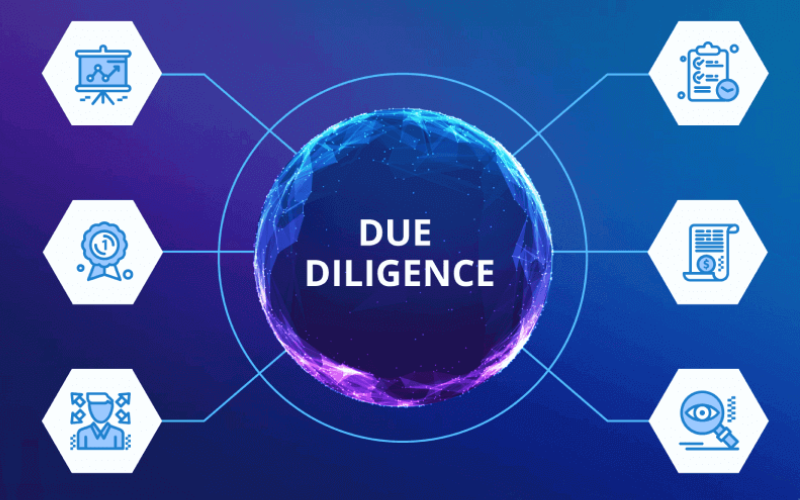In 2018, an artificial intelligence algorithm known as ‘soon-to-market detection’ made waves in the real estate industry by successfully acquiring two properties in Philadelphia for $26 million.
This wasn’t just a one-time feat. Since then, artificial intelligence and machine learning (ML) have become the driving force behind the exponential growth in innovative solutions across the real estate landscape.
From automating mundane tasks to unlocking hidden investment opportunities, AI is transforming how we interact with property.
As these intelligent systems become more deeply integrated into the industry, realtors are wielding them to achieve remarkable results. Let’s delve into the most impactful ways AI is shaping the future of real estate.
Virtual Tour for Real Estate Viewings

The way we experience properties is undergoing a dramatic transformation, fueled by the convergence of artificial intelligence (AI), virtual reality (VR), and augmented reality (AR). Gone are the days of endless physical viewings – AI is ushering in a new era of immersive and convenient property exploration.
The artificial intelligence age is an era where potential buyers can tour a property remotely, without the need to physically step foot on the site.
These tours offer a far richer experience than traditional photographs, allowing users to navigate through the property in a 360-degree environment, getting a true sense of the space, layout, and overall flow.
By offering virtual tours, realtors can significantly expand their reach, attracting a wider pool of potential buyers without geographical limitations.
The artificial intelligence revolution doesn’t stop there. AR takes the virtual experience a step further. Imagine a potential buyer using their smartphone or tablet to virtually place their furniture within the property during a virtual tour. This will allow them visualize the space as their own, fostering a stronger emotional connection and aiding decision-making.
Revolutionizing Lead Generation

In the dynamic realm of real estate, lead generation stands as the cornerstone of success. Without a steady flow of potential clients, even the most exceptional properties can languish on the market.
However, with the integration of artificial intelligence (AI) into lead generation strategies, real estate professionals can unlock unprecedented efficiency and precision in identifying and nurturing leads.
AI serves as a powerful ally in the quest for qualified leads, leveraging advanced algorithms to sift through vast amounts of data from diverse sources.
From social media platforms and landing pages to website visits and online listings, AI scours the digital landscape to pinpoint individuals exhibiting genuine interest in real estate offerings.
By harnessing AI-driven lead generation tools, sales representatives can optimize their efforts by focusing squarely on the most promising prospects.
Rather than squandering valuable time and resources on leads with minimal potential, AI enables realtors to prioritize those most likely to convert into tangible sales opportunities. This targeted approach not only enhances productivity but also significantly increases the likelihood of successful deal closures.
Moreover, AI empowers real estate businesses to streamline their lead management processes, facilitating swift and seamless transitions from initial contact to final transaction.
Through automated lead nurturing campaigns and personalized communication strategies, AI ensures that leads remain engaged and informed throughout the entire sales journey.
Automating Listing Descriptions

Another innovative way artificial intelligence has revolutionised real estate is the ease at which the cumbersome time-consuming tasks of crafting compelling property listings have been demistified.
Traditionally, real estate agents or property managers have had to manually draft detailed descriptions for each listing, a process that is not only labour-intensive but also prone to human error. Enter AI-powered listing description generation, a game-changer in the industry.
AI technologies, such as natural language processing (NLP) models, can understand and generate human-like text so real estate professionals can automate the generation of listing descriptions, saving valuable time and resources.
There are several approaches to implementing AI for listing descriptions. Off-the-shelf software solutions offer pre-built models that can effectively create property listings based on input data. These tools provide a quick and convenient option for those looking to streamline their listing process without extensive development effort.
For those seeking more customized solutions, building a bespoke AI application tailored to specific needs is also an option. This approach allows for greater flexibility and control over the generated content. Integrating AI language models like ChatGPT into existing systems can further enhance the capabilities of these custom solutions.
Reimagining Property Management

The real estate industry is undergoing a significant transformation, driven by the ever-evolving capabilities of artificial intelligence (AI). Property management, a sector traditionally reliant on manual processes and human oversight, is at the forefront of this change. AI tools are streamlining operations, improving efficiency, and empowering realtors to make data-driven decisions.
One of the most impactful applications of AI in property management lies in **information organization and analysis**. By leveraging AI-powered software, property managers can effortlessly track a vast amount of data, including rental and property listings, tenant applications, lease agreements, and maintenance requests. This centralized data repository eliminates the need for cumbersome spreadsheets and paper trails, allowing for quick retrieval and insightful analysis.
Imagine a property manager being able to instantly identify trends in tenant preferences. With AI, they can analyze historical data to understand what kind of amenities are most sought-after, what rental prices attract the most qualified tenants, and even predict seasonal fluctuations in demand. This empowers them to make informed decisions about property upgrades, pricing strategies, and targeted marketing campaigns.
Furthermore, AI can be a valuable tool for identifying potential issues before they escalate. By scanning property documents for errors and inconsistencies, AI can flag missing signatures, incomplete forms, or any other anomalies that could lead to legal or financial complications down the line. This proactive approach ensures that all paperwork is completed accurately and efficiently, saving time and minimizing the risk of errors.
The benefits of AI in property management extend beyond simple data management. AI-powered chatbots can provide 24/7 customer service to tenants, addressing their queries and concerns efficiently. Additionally, AI can be used to automate routine tasks such as rent collection and sending maintenance reminders, freeing up valuable time for property managers to focus on higher-level tasks.
However, it’s important to remember that AI is not meant to replace human property managers entirely. Instead, it serves as a powerful augmentation tool, allowing realtors to focus on their core strengths – building relationships with tenants, providing exceptional customer service, and overseeing the overall well-being of their properties.
As AI technology continues to evolve, we can expect even more innovative applications to emerge in the realm of property management. From predictive maintenance that identifies potential equipment failures before they occur, to virtual reality tours that allow prospective tenants to explore properties remotely, the future of property management is undoubtedly shaped by artificial intelligence. By embracing this transformative technology, real estate professionals can unlock new levels of efficiency, gain valuable insights, and ultimately deliver a superior experience for both tenants and property owners.
Fraud and Compliance Detection

As the real estate landscape evolves, so too do the challenges faced by industry stakeholders, particularly in the realm of fraud detection and compliance. With the proliferation of AI-generated images and content, MLS providers are increasingly tasked with identifying manipulated listings and deceptive descriptions that pose significant risks to both administrators and brokers.
The repercussions of fraudulent listings extend far beyond mere reputational damage, carrying potentially severe penalties for those found in violation of regulatory standards. Inaccurate or misleading listing data not only erodes trust within the marketplace but also undermines the integrity of the entire real estate ecosystem.
Fortunately, artificial intelligence offers a beacon of hope in the fight against fraud and compliance breaches. Leveraging cutting-edge technologies such as computer vision and machine learning, AI-powered solutions can adeptly sift through vast troves of listing data to identify signs of manipulation or misrepresentation.
One of the primary areas where AI excels is in the detection of altered images and deceptive descriptions with the use of AI algorithms that can swiftly flag listings that exhibit telltale signs of manipulation, such as digitally altered photos or exaggerated claims.
Personalized Property Recommendations

the quest for the perfect property can often feel like searching for a needle in a haystack in the vast landscape of real estate. Despite the plethora of house-searching applications offering advanced search filters, investors still grapple with the challenge of sifting through a sea of irrelevant listings to find their ideal investment opportunity.
However, the advent of artificial intelligence (AI) in commercial real estate has heralded a new era of personalized property recommendations, revolutionizing the way investors navigate the market.
Traditional house-searching applications provide users with a myriad of search filters, allowing them to specify their preferences for price, design, square footage, location, and more. Yet, even with these advanced filters, the process of finding suitable properties remains daunting, as users often encounter listings that fail to align with their expectations.
Enter AI-powered suggestion engines, the cornerstone of modern property search applications. By harnessing the power of AI, these engines leverage sophisticated algorithms to analyze user preferences and behaviour, delivering tailored property recommendations that resonate with individual investors.
One exemplary application of AI-driven personalization in the real estate realm is Trulia which is renowned for its innovative approach to property search. Trulia utilizes AI algorithms to analyze user behaviour and preferences, delivering highly relevant and personalized property recommendations. Trulia empowers investors to streamline their property search process, saving valuable time and effort in the pursuit of their investment goals.
Streamlining Due Diligence and Mitigating Risk

The real estate industry thrives on meticulousness – a single oversight in a crucial document can have significant financial repercussions. This is where artificial intelligence (AI) steps in, offering a revolutionary approach to due diligence, the process of verifying the accuracy and completeness of information before a transaction.
Due diligence involves a mountain of paperwork and manual data entry, a breeding ground for human error when handled traditionally. Artificial intelligence, however, automates much of this process, significantly reducing the risk of mistakes.
By analyzing vast amounts of data from various sources, including lease agreements, loan applications, and public records, AI can identify inconsistencies and inaccuracies with pinpoint precision. Imagine AI swiftly comparing figures across multiple documents, flagging mismatched values that might indicate errors or even potential fraud. This not only streamlines the loan approval process but also safeguards lenders from financial risks associated with inaccurate information.
Also, AI-powered tools can automate document reviews, meticulously scanning contracts and agreements for missing signatures, incomplete sections, or any other anomalies that could pose legal challenges later. This not only expedites the due diligence process but also ensures all paperwork adheres to the highest standards of accuracy and completeness.
However, the power of AI in due diligence isn’t limited to error detection. AI can also be harnessed to uncover hidden risks and opportunities. By analyzing market trends, property values, and historical data, AI can generate valuable insights that might not be readily apparent through traditional methods. This empowers real estate professionals to make informed decisions, mitigate potential risks, and ultimately secure more favourable deals.
Unveiling the Hidden Gems with Property Analysis

For any investor, pinpointing the perfect property with the potential for high returns is a constant pursuit. But determining the right price often feels like navigating a labyrinth – a complex equation factoring in a multitude of variables.
Property analysis usually relies on experience and intuition, leaving room for subjectivity and human error but with AI, investors are empowered with a potent tool giving them the ability to analyze vast amounts of data to uncover hidden trends and make informed decisions.
Crime rates, proximity to transportation hubs, noise levels, and access to schools and hospitals – are just a few of the data points AI can analyze to paint a comprehensive picture of a neighbourhood’s livability. Additionally, AI can delve into historical data on purchasing trends and future development projects, providing invaluable insights into a property’s potential for appreciation.


